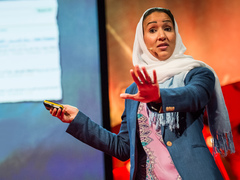[vimeo http://www.vimeo.com/69568276 w=560&h=315]
The weeks after TEDGlobal require serious debriefing. Throughout the course of the conference — which took place June 10 to 14 in Edinburgh, Scotland — the mind is crammed full of so many fascinating ideas that it takes some time to process them. As we look back on the conference, and continue to post talks from it, the TED Blog wanted to share the incredible slideshow above of images shot at the event by photographers James Duncan Davidson, Ryan Lash and Bret Hartman. (The piece was cut by our own Dian Lofton, to the song “Joyful Jingling” from Espanto.) And below, we invited Katerina Biliouri — the editor-in-chief of TEDxThessaloniki and our TEDGlobal photo assistant — to share her musings on the conference.
By Katerina Biliouri
One extra duffel bag, seven books from speakers, numerous new contacts and tons of new ideas: that was my “overload” while checking in at the airport on my way back from TEDGlobal 2013. Luckily, airlines haven’t come up with any “excess ideas” fee. Or at least, not yet.
“Think Again” was definitely a successful and all-encompassing theme for such an event. In other words—rethink, reconsider and view through different eyes. Each speaker invited us to cleanse assumptions, an ongoing thinking process that spilled into conversations over lunch and drinks. Even two weeks after the conference, I find myself reading more on the people and ideas presented at TEDGlobal, following organizations and trends from the conference on twitter, and sharing the experience from the most inspirational talks with friends and family. I find myself thinking again, on repeat.
Going through my notes, scribbled almost next to each speaker was the word “choice.” In the closing of her talk on the problem of choice, Renata Salecl (read about her talk) urged us to open up the image of an idealized future; a future in which we do not make personal choices linked to passive denial, but rather choices based on the kind of society we want to live in. That was exactly the case with most speakers, whose choices deviated from the standard path and aimed at a better world.
 Joseph Kim: The family I lost in North Korea. And the family I gained.
Joseph Kim (watch his talk) chose hope and escaped from North Korea, while Manal al-Sharif (watch her talk) chose to advocate for women’s right to drive in Saudi Arabia. While tutoring in science and math, Uri Alon (read about his talk) challenged us to ask “yes and?” to find an alternate path to a conclusion, while Arthur Benjamin (read about his talk) chose to see the magic in mathematics. In the world of art, Tania Bruguera (read about her talk) decided to become an “artivist” and Alexa Meade (read about her talk) chose to look at the shadows in a different way, challenging our understanding of dimensions. Salvatore Iaconesi (read about his talk) saw his own brain cancer as an opportunity for a bold open-source project and Kelly McGonigal (read about her talk) spoke about how stress is good for us, if we choose to embrace it.
Joseph Kim: The family I lost in North Korea. And the family I gained.
Joseph Kim (watch his talk) chose hope and escaped from North Korea, while Manal al-Sharif (watch her talk) chose to advocate for women’s right to drive in Saudi Arabia. While tutoring in science and math, Uri Alon (read about his talk) challenged us to ask “yes and?” to find an alternate path to a conclusion, while Arthur Benjamin (read about his talk) chose to see the magic in mathematics. In the world of art, Tania Bruguera (read about her talk) decided to become an “artivist” and Alexa Meade (read about her talk) chose to look at the shadows in a different way, challenging our understanding of dimensions. Salvatore Iaconesi (read about his talk) saw his own brain cancer as an opportunity for a bold open-source project and Kelly McGonigal (read about her talk) spoke about how stress is good for us, if we choose to embrace it.
 Manal al-Sharif: A Saudi woman who dared to drive
Manal al-Sharif: A Saudi woman who dared to drive
On the notion of motherland, Holly Morris (read about her talk) told the story of the “babushkas of Chernobyl”, who chose to return to their homeland, despite being one of the most contaminated lands on earth. A reality that embodies Pico Iyer’s (read about his talk) belief that home is not the place where you sleep, but where you stand and become yourself. Bernie Krause (read about his talk) spoke about recording endangered species and Gavin Pretor-Pinney (read up on his talk) about appreciating the clouds, both choosing to experience nature through different ears and eyes. Hetain Patel (read about his talk) and Sonia Shah (read about her talk) both challenged the issue of “otherness”; the first through his performance that questioned identity and the latter by viewing malaria through the eyes of those affected and not the those who wish to cure them. Last but not least, Gregoire Courtine (read about his talk) and his team chose to dream the “personalized neuroprosthetics” applied to humans, opening up a new world of possibilities in spinal cord recovery.
The more time goes by, the more these ideas become interconnected, processed and grouped, based either on similar or conflicting theories. Ideas spinning in my head that — along with all the books tucked in that extra duffel bag — will accompany at least an entire summertime. So yes. If you thought that TEDGlobal lasted for a week, then “Think Again.”
Comments (5)
Pingback: TED ache | Diane Sherlock
Pingback: TEDGlobal – Inspiration overload! ‹ Alfa Bravo